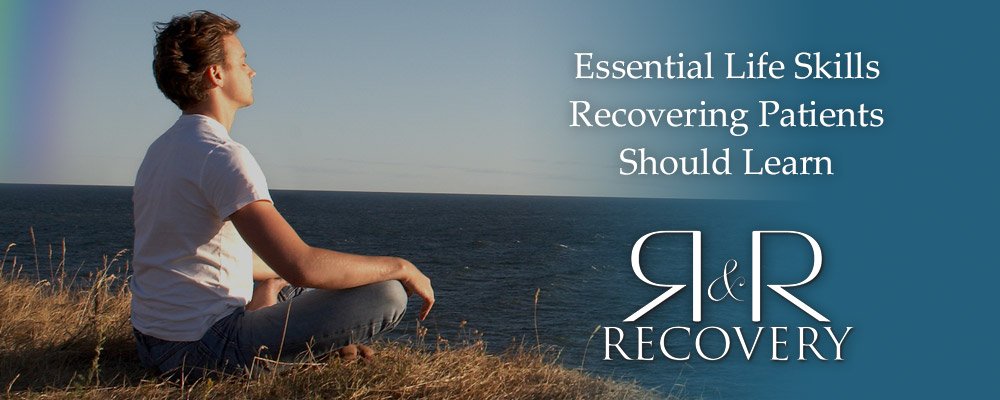
Essential Life Skills Recovering Patients Should Learn
Addiction recovery does not end after inpatient treatment. It is a lifelong journey that must be sustained every single day in order to prevent a relapse and to achieve full independence. After inpatient treatment, it is time to teach the patients some essential life skills so that they can rejoin society as better individuals.
These life skills will help them stay sober and prevent a relapse. The normal world is filled with temptations, from seeing an addictive substance on the TV to bumping into an enabler from the past. These could trigger a thirst for a fix but with the essential life skills, the patient can have the proper tools to resist such temptations.
Relapses typically occur within the first 6 months after being released from inpatient professional treatment. However, this does not mean that a relapse should automatically be a part of your story. You can use these skills to arm yourself against relapse and help you recover at the instance of one.
Essential Life Skills To Learn
Self-Care
Self-care is the baseline for successful recovery. It stems from the patient’s love for themselves which leads them to make healthier choices. Self-care is all about maintaining one’s health and wellbeing. It is about putting yourself first and prioritizing doing things that you love and make you happy.
You can practice self-care by first listing down the things that make you feel happy and positive. Next, engineer your environment so that these things will be supported. For instance, if you feel like yoga and meditation make you feel better, then you should structure your daily schedule to include a time slot for a meditation session. It also helps to have some meditation essentials like a yoga mat as well as a quiet place at home to perform your session.
Healthy Routines
A healthy mind and body are your first line of defense against a relapse. Being healthy physically and mentally allows you to think clearly and make better choices. As such, it is important to uphold a healthy daily routine that focuses on physical health, personal hygiene, and a good diet.
Your routine should also include getting an ample amount of sleep so that you can wake up each morning feeling refreshed and energized. Treatment plans like 12-step programs and therapy sessions should also be a part of your routine. Having a fixed schedule and flow of events each day will help you stay busy and grounded. You are less likely to dwell on negative thoughts when you are busy nurturing your body and soul.
Time Management
This life skill is related to establishing healthy routines. Your addiction may have been a result of too much idle time. Your days might have been a blur and disorganized which led you to try out addicting substances. Eventually, you might have let go of time management as you succumbed fully to the addiction. Every waking moment is either spent with it or looking for it.
Time management helps you prevent relapse by ensuring that every hour each day is accounted for something healthy and positive.
Problem Solving
Decision-making and critical thinking are important life skills for correct guidance. This allows the patient to carefully assess their next steps as these have impacts on other people and on their future. Problem-solving skills allow them to face any hurdle and overcome it, rather than be consumed by negative feelings that can spiral into a relapse.
Problem-solving allows the patient to spot a problem before it worsens and provide solutions for it. This allows them to pick the best route that will benefit them and do no harm to their friends and loved ones.
Creative Thinking
Creative thinking allows the patient to see more details about the world we live in. This empowers them to explore different possibilities, particularly those beyond the norm. Creative thinking inspires a person to be ambitious and strong. This does not necessarily need artistic skills. A creative form of thinking can also be applied in places of employment so that one can come up with creative solutions to overcome struggles.
Resilience
Resilience is the ability to handle loss and disappointment. Life is hard and having the mental tools to understand that such is the case instead of trying to control everything can make the difference in a successful recovery.
The patient must learn how to be resilient so that they can handle anxiety, grief, and anger better. These feelings usually arise from facing hurdles and learning resilience allows them to come out stronger. Their optimism and positive spirit will give them a better fighting chance against the hardships of life.
These essential life skills will be introduced in inpatient rehab. The patients will be taught how to be more intentional with their words and actions so that they will develop these skills over time. They will also be taught how to engineer a life post-rehab so that these skills will be supported.
There is no crash course that instantly grants you these skills as they take hard work and habit formation for them to stick around. Developing them alongside experts at R&R Recovery will greatly accelerate the process.




